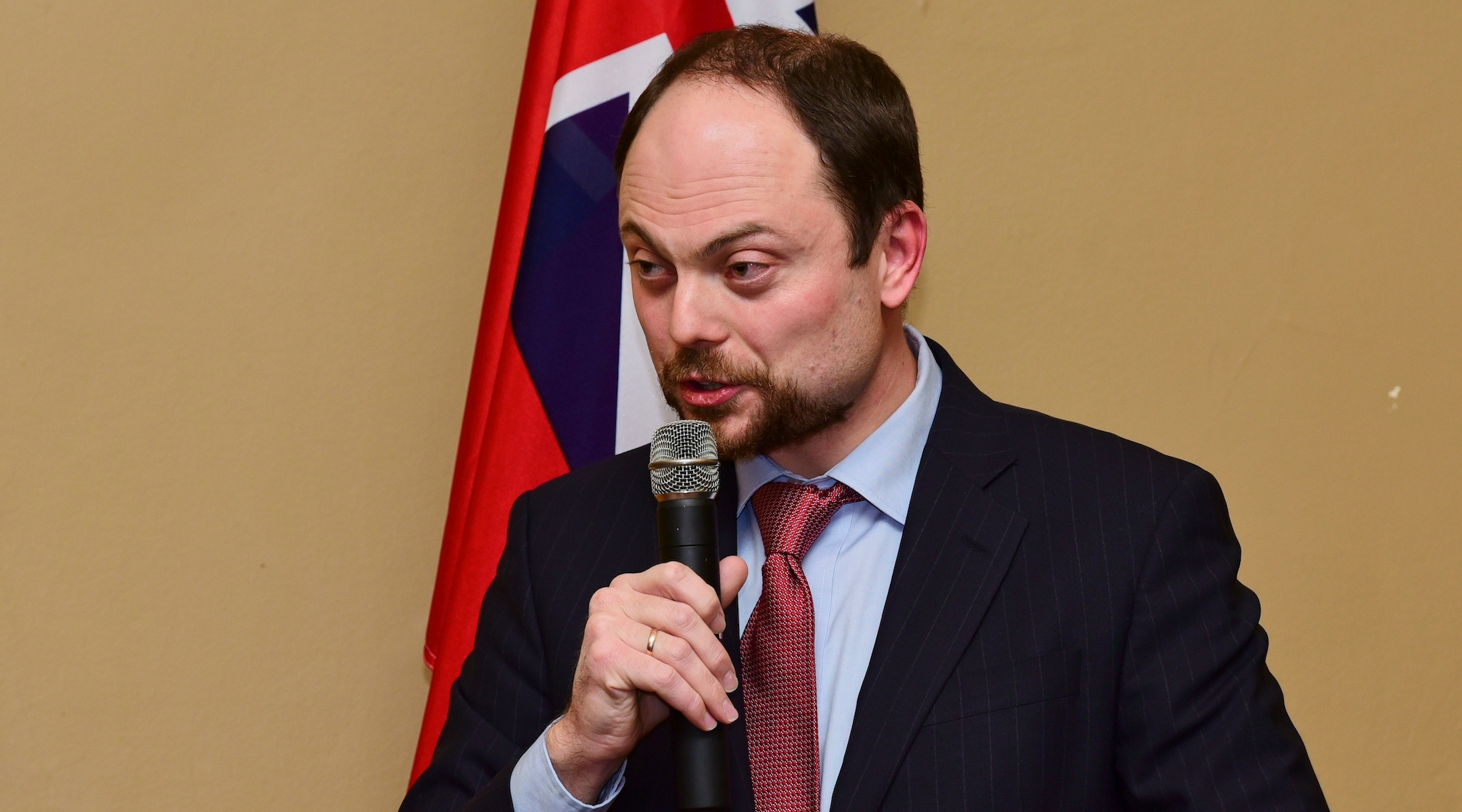Vladimir Kara-Murza, Russian Jewish dissident, sentenced to 25 years in prison for treason
Prominent Jewish figures, including Natan Sharansky, have rallied to Kara-Murza’s defense

Vladimir Kara-Murza, pictured in Toronto in 2018, has been sentenced to 25 years in prison in Russia. (Mykola Swarnyk/Wikimedia Commons)
(JTA) – A Russian Jewish dissident whose case has attracted support from human rights groups and prominent Jewish activists was sentenced to 25 years in prison for treason on Monday.
Vladimir Kara-Murza, 41, received the harshest sentence given to a critic of the Kremlin in the 14 months since Russia first invaded Ukraine. The charges were handed down roughly a year after Kara-Murza had accused Russia of committing war crimes in Ukraine during a speech to the Arizona state legislature. The charges included discrediting the Russian military and spreading “knowingly false information” about its actions in Ukraine.
Kara-Murza’s sentence came after years of tensions between him and Putin’s government that recently culminated in his urging for the West to impose sanctions on Russia as punishment for its war in Ukraine. He has been poisoned twice and has blamed the Kremlin for both instances, while the government has denied its involvement.
When Kara-Murza heard the sentence, his lawyer told the BBC, he took it as a sign of the effectiveness of his criticism. “My self-esteem even rose,” the lawyer quoted Kara-Murza as saying. “I realized I’d been doing everything right.”
The Raoul Wallenberg Centre for Human Rights, a Canada-based consortium of human rights NGOs named after the diplomat who rescued 100,000 Jews during the Holocaust, and where Kara-Murza is a senior fellow, condemned his sentencing on Twitter and called the charges a “sham.”
“His unlawful imprisonment cannot go unanswered,” the center said in a statement. “We must not relent until Vladimir is free. His wife and children need him free. Russia needs him free. The world needs him free.”
Former Soviet Jewish dissident Natan Sharansky, who met in the past with Kara-Murza, has also condemned Russia’s treatment of him. Sharansky spent nine years in Soviet prison due to his activism, and recently told the Times of Israel that Kara-Murza’s prosecution was “evidence that Russia has returned to Stalinist times.” One of the items Kara-Murza has been allowed to keep in prison is a copy of “Fear No Evil,” Sharansky’s 1988 memoir about his time in the gulag.
“Putin’s case against Vladimir Kara-Murza is a case against democracy, human rights and civil society in Russia,” Sharansky tweeted last week. “All of us who want to see Russia shed its current dictatorial path and the shadow it casts over Europe, must stand with Kara-Murza today.”
Former Canadian Attorney General Irwin Cotler, who is Jewish, has also come to Kara-Murza’s defense, saying in a statement, “Vladimir’s conviction represents the criminalization of freedom in Putin’s Russia and is a conviction of the country’s corrupt courts.”
Leon Aron, another Russian Jewish advocate for Kara-Murza who serves as a senior fellow at the conservative American Enterprise Institute, wrote in Politico that “Only Putin’s death can free my friend Vladimir.” In 2017, Aron had asserted in the Jewish publication Mosaic that Putin was not explicitly antisemitic, but warned that he would “almost certainly” begin indulging in antisemitism “after an embarrassing military defeat.”
The day after Kara-Murza’s sentence was handed down, a Russian court denied release to Wall Street Journal reporter Evan Gershkovich, the American son of Soviet Jewish refugees. Gershkovich was arrested on espionage charges last month and could face up to 20 years in prison; his detention has been widely condemned by Western officials and organizations as an attack on press freedom, and Jewish groups have rallied to his defense. Analysts believe Gershkovich was targeted by the Kremlin for his reporting on its invasion of Ukraine.
This article originally appeared on JTA.org.






















